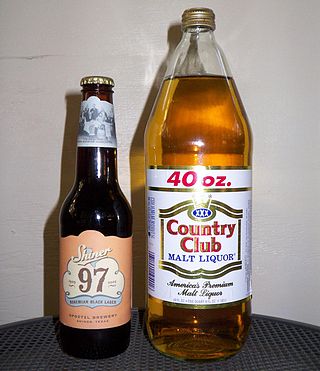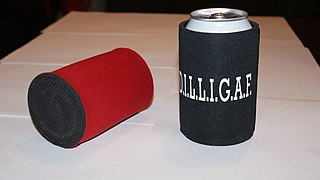
A vacuum flask is an insulating storage vessel that slows the speed at which its contents change in temperature. It greatly lengthens the time over which its contents remain hotter or cooler than the flask's surroundings by trying to be as adiabatic as possible. Invented by Sir James Dewar in 1892, the vacuum flask consists of two flasks, placed one within the other and joined at the neck. The gap between the two flasks is partially evacuated of air, creating a near-vacuum which significantly reduces heat transfer by conduction or convection. When used to hold cold liquids, this also virtually eliminates condensation on the outside of the flask.

Gatorade is an American brand of sports-themed beverage and food products, built around its signature line of sports drinks. Gatorade is currently manufactured by PepsiCo and is distributed in over 80 countries. The beverage was first developed in 1965 by a team of researchers led by Dr. Robert Cade. It was originally made for the Gators at the University of Florida to replenish the carbohydrates that the school's student-athletes burned and the combination of water and electrolytes that they lost in sweat during vigorous sports activities.

A lunch box refers to a hand-held container used to transport food, usually to work or to school. It is commonly made of metal or plastic, is reasonably airtight and often has a handle for carrying.

Malt liquor is a type of mass market beer with high alcohol content, most closely associated with North America. Legally, it often includes any alcoholic beverage with 5% or more alcohol by volume made with malted barley. In common usage, it refers to beers of high alcohol content, generally above 6%, which are made with ingredients and processes resembling those for American-style lagers.

Tang is an American drink mix brand that was formulated by General Foods Corporation food scientist William A. Mitchell and General Foods Corporation chemist William Bruce James in 1957, and first marketed in powdered form in 1959. The Tang brand is currently owned in most countries by Mondelēz International, a North American company spun off from Kraft Foods in 2012. Kraft Heinz owns the Tang brand in North America.

The Coca-Cola Company is an American multinational corporation founded in 1892. It produces Coca-Cola. The drink industry company also manufactures, sells, and markets other non-alcoholic beverage concentrates and syrups, and alcoholic beverages. The company's stock is listed on the NYSE and is part of the DJIA and the S&P 500 and S&P 100 indexes.

Capri-Sun is a brand of juice concentrate–based drinks manufactured by the German company Wild and regional licensees. Rudolf Wild invented the drink in 1969 and introduced it in West Germany as Capri-Sonne. It is now sold in over 100 countries, with licensees including Kraft Foods in the United States and Coca-Cola Europacific Partners in parts of Europe. It is one of the most popular juice brands in the world; as of 2023, roughly 6 billion pouches are sold per year globally.

Naked Juice is an American brand that produces juices and smoothies. The company is based in Monrovia, California and is owned by PAI Partners. The first Naked Juice drink was produced in 1983 and sold in California under the name "Naked Juice", referring to the composition of no artificial flavors, added sugar, or preservatives. Distribution has since expanded, and Naked Juice products are distributed in the United States, as well as in Canada, the United Kingdom, the Netherlands and France, among others.

Monster Beverage Corporation is an American beverage company that manufactures energy drinks including Monster Energy, Relentless and Burn. The company was originally founded as Hansen's in 1935 in Southern California, originally selling juice products. The company renamed itself as Monster Beverage in 2012.
California Redemption Value (CRV), also known as California Refund Value, is a regulatory fee paid on recyclable beverage containers in the U.S. state of California. The fee was established by the California Beverage Container Recycling and Litter Reduction Act of 1986 and further extended to additional beverage types in California State Senate Bill No. 1013, signed into law on September 28, 2022 and taking effect on January 1, 2024; since 2010 the program has been administered by the Cal/EPA California Department of Resources Recycling and Recovery (CalRecycle).
Tiger Corporation is a Japanese manufacturer that applies vacuum insulation and heat control technology to consumer electronic appliances. Their headquarters are located in Kadoma City in Osaka, Japan. The company manufactures and sells appliances such as household and commercial vacuum insulated containers and stainless-steel bottles, along with cooking appliances such as rice cookers. The company also manufactures industrial parts and products used in automobiles, homes, air conditioners, space, and medical care in 60 countries around the world.

Sigg Switzerland AG is a Swiss manufacturing company with its headquarters in Frauenfeld. Sigg bottles are bottles designed and manufactured in Switzerland from aluminum and polypropylene or in China from stainless steel and glass. The company is famous because of the iconic shape its classic bottle and numerous designs which have led to its addition to the permanent design collection of the New York Museum of Modern Art.

A koozie (US) or stubby holder (Australian) is a fabric or foam sleeve that is designed to thermally insulate a beverage container, like a can or bottle.

Aladdin is a brand notable for its line of character lunchboxes including Hopalong Cassidy, Superman, Mickey Mouse and The Jetsons. Today, Aladdin continues to be a food and beverage products brand and is owned by Pacific Market International, LLC of Seattle, Washington and Aladdin continues to be a kerosene lamps and wicks products brand and is owned by Hattersley Aladdin Ltd of the United Kingdom.
Tervis Tumbler Company is an American manufacturer of double-walled, insulated tumblers. The double-wall insulation is made by inserting a liner inside an outer shell, creating a layer of air between them. The two liners are then permanently fused together. The insulation reduces condensation and keeps beverages hotter or colder longer than non-insulated cups and glasses.
Thermos LLC is a manufacturer of insulated food and beverage containers and other consumer products. The original company was founded in Germany in 1904.

S'well is a reusable water bottle and insulated products company headquartered in Manhattan, New York. Sarah Kauss founded the company in 2010 and was the company's CEO until 2020.
The Stanley Cup is an ice hockey championship trophy.
The Stanley Quencher, also known as a Stanley cup, is a reusable stainless steel tumbler that comes in 14, 20, 30, 40, and 64 US fluid-ounce sizes, introduced by Stanley in 2016. It became popular as a result of influencer marketing campaigns on social media, particularly TikTok.















